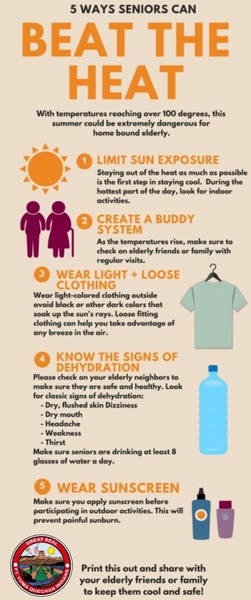Latest News
Back to Articles
Heat illness is a preventable condition, but has been the number one weather-related cause of death in the United States. According to the Environmental Protection Agency (EPA), heat illness causes more deaths than hurricanes, lightning, tornadoes, floods, and earthquakes combined. From 2009 to 2019, over 2,000 deaths were caused from exposure to excessive natural heat. Of deaths among Arizona residents, 34 percent occurred in older adults over the age of 65. The Heat and Older Adults Safety Toolkit (HOAST) was created to provide older adults and caregivers information to stay safe in the heat.
What is Heat Illness?
Heat illness occurs when the body becomes too hot and is no longer able to regulate its own temperature. There are several types of heat illness; three of the most common are heat cramps, heat exhaustion, and heat stroke.
Why are Older Adults More Vulnerable?
The Centers for Disease Control and Prevention (CDC) states older adults, those aged 65 and older, are particularly vulnerable to heat illness. Age is a risk factor because older adults do not adjust as well to changes in temperature compared to when they were younger. They are also most likely to have a chronic medical condition that alters the body's normal response to heat. Prescription medicine use is also common in older adults. Some prescription medicines can impair the body's ability to regulate its temperature or can inhibit perspiration.
Indoor Heat Exposure
Indoor heat exposure is a major contributor to heat-related deaths in older adults. According to Yip et al. (2008), one third of deaths during the 2005 heat wave in Arizona happened indoors; 81% of these fatalities occurred in older adults. The EPA states that elderly people spend 90% of their time indoors, therefore maintaining an appropriate indoor air temperature is important.
Chronic Medical Conditions
Individuals with certain medical conditions can also be more vulnerable to heat effects.
- Cardiovascular Conditions
- Respiratory Conditions
- Diabetes
- Obesity
Prescription Medicines
Talk to your health care provider to find out what medications you take that will interact with the heat. Below is a list of medicines that are known to be affected by heat.
- Antidepressants
- Diuretics
- Sleep Aids
- Parkinson's drugs
- High blood pressure medicines



.jpg)
.jpg)
